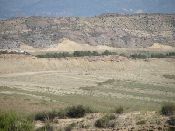| Study site location & description |
 |
|
The Secano Interior study site is located west of the city of Cauquenes, central Chile.
Erosion is the main cause of degradation of the soils in Chile. Due to the topographic conformation of the country, with two large mountain ranges along the country, and the rain intensity and distribution, which is highly concentrated in winter, water erosion is the most important form of soil degradation. With a territorial area of 75.49 M ha, 46% (34.491 M has) are affected by erosion of different degrees; 7% of soils presents a severe erosion, while 27% are highly eroded, 44% moderately degraded and 22% are in state of light erosion degree (IREN, 1979). In the Mediterranean climate area of Central Chile, in particular the unirrigated area ("secano interior") of central Chile (30° - 37°S), soil degradation and desertification are actually the main environmental problems. Most of this 2 million ha is occupied by a traditional agricultural system that combines livestock activities with the production of cereals. As a result of the prevailing land use systems, about two thirds of "secano interior" soils are badly eroded and soil organic matter and microbial biomass are very low in many places (Ovalle, et al., 1990). At macro regional level, the erosion has provoked environmental imbalances, like siltation of rivers and ports, and serious problems of floods as much as rural level as in the cities. The studies will contribute to the rehabilitation and development of one of the most economically depressed areas of the country, with high levels of rural poverty and degradation of the natural resources. In particular, it is expected that appropriate technologies for the sustainable management of these fragile soils will be transfer to farmers and associations, institutions and technical staff involve in soil conservation and local governments. A concrete contribution is expected in the area of the development of production systems through the incorporation of cover crops and agroforestry systems with multi purpose trees and pastures, and the development of new crop systems and crop rotations with incorporation no tillage of cultivation systems. Besides, studying how to improve agronomic practices would allow to increase soil fertility and the productive potential of this extensive area of the country.
|
|||||||||||||||
Study sites

Acknowledgement
The DESIRE project was
|
DESIRE brought together the expertise of
26 international research institutes
and non-governmental organisations.
This website does not necessarily
represent the opinion of the
European Commission. The European
Commission is not responsible for
any use that might be made of the
information contained herein. 







